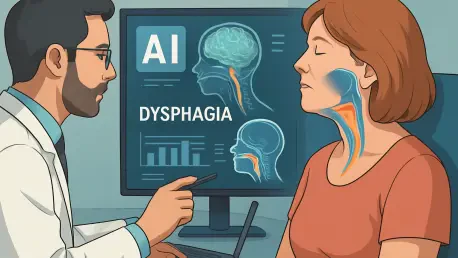The intricate process of swallowing involves the seamless coordination of muscles and structures, a complexity underscored by the suffering caused when this coordination fails, as seen in dysphagia patients. This disorder not only jeopardizes nutrition and increases the risk of aspiration pneumonia but also diminishes patient quality of life by complicating social meals. Videofluoroscopic swallowing studies (VFSS) have long been the gold standard for such diagnoses, but they require laborious frame-by-frame analysis by trained professionals. However, recent advancements in artificial intelligence (AI) promise to revolutionize this process, making diagnostics more efficient and accurate.
Innovative Approach and Methodologies
This research delves into the application of deep learning—a subset of AI—to streamline VFSS analysis. By employing advanced convolutional neural networks (CNNs), like Xception and EfficientNetB0, the study seeks to autonomously analyze VFSS videos, reducing the manual workload in detecting penetration and aspiration events. These models excel in processing visual information, focusing on regions of interest in complex medical imagery. The research bypasses the traditionally manual and time-consuming tasks of dataset annotation by utilizing AI methods such as Synthetic Minority Oversampling Technique (SMOTE) to address class imbalances, enhancing the quality and representation of the underlying data.
Key Findings and Implications
The study effectively demonstrates that AI-driven analysis of VFSS markedly enhances diagnostic accuracy and efficiency. The developed AI model can accurately detect normal and abnormal swallowing patterns, reducing errors associated with human fatigue and oversight. Notably, the model’s capability to autonomously extract key frames and regions of interest elevates its utility in clinical settings, supporting clinicians in making more informed decisions quickly. Such automation promises not only to expedite diagnostics but also to free up valuable medical resources, allowing healthcare professionals to focus on patient care and treatment strategies.
Despite these advances, the research acknowledges challenges tied to model generalizability, particularly concerning small dataset sizes and the manual interventions in VFSS. Addressing these concerns through expanded datasets and further validation is crucial for the robust application of AI in medical diagnostics. Nevertheless, the integration of AI into VFSS analysis signifies a significant step forward in dysphagia management, with potential adaptations in other areas of medical diagnostics.
Future Directions and Considerations
Reflecting on the research process, the approach highlighted both opportunities and challenges in incorporating AI into medical diagnostics. Addressing issues related to class imbalance and the limitations of the contrast medium utilized in VFSS remains imperative to ensure model reliability. Moreover, the necessity for extensive external validation remains clear, as it would affirm the model’s reliability across varied clinical environments.
Looking ahead, the potential for AI in medical diagnostics is expansive. Future research could explore augmented AI techniques, larger and more diverse datasets, and cross-validation with other dysphagia diagnostic methods. As AI continues to evolve, its integration into clinical practice will likely become more seamless, transforming not only the diagnosis of swallowing disorders but also broader medical diagnostic landscapes.
Closing Thoughts and Call for Action
The research outlined offers profound insight into the intersection of technology and medical diagnostics, specifically regarding VFSS interpretation. While AI has demonstrated potential to reduce manual labor burdens and improve diagnostic outcomes, the path forward requires ongoing commitment to research and development. By focusing on practical applications, expanding dataset accuracy, and continuing validation efforts, AI can substantially enhance patient care and outcomes.
The study leaves the medical community poised on the cusp of a new era in dysphagia management, encouraging further exploration into AI’s broader applications. As the healthcare landscape continually seeks efficiency and accuracy, such advancements offer a promising horizon for improving patient diagnoses and treatment pathways.









